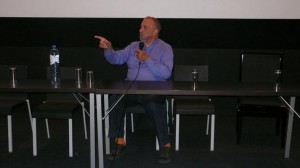Jean-Claude Carrière at the Screenwriting Research Conference, Brussels, sept 8-10, 2011
some quotes of Jean-Claude Carrières talk about how to teach screenwriting
“Very few people understand what I said, the big news: That there is a cinematographic language, it does exist. It has nothing to do with literature or painting. And if you want to learn or teach, or to do things together about screenwriting, you have to know this writing, this language. If not, it would be like trying to write in Chinese – without knowing Chinese.”
“I used to say that the best possible script is the script that you don’t notice, when you see the film. I very often compare a script to a caterpillar, which contains all the elements, colors, substances of the butterfly, but it doesn’t fly.”
“The moment you notice how a film is written – not made, that’s something different – but written, it means something is missing in the work of the screenwriter. The language of film has a certain number of very different elements. The first one is of course the image and the sound, and the game between the different frames of the image. That’s absolutely specific to the movie. That’s why many people say, cinema is “the art of the image”, which is absolutely wrong. If there is an “art of image” – maybe photography. “Cine” comes from “movement”, this motion of movement is never to be forgotten. There is a movement that we follow in a film in every frame, in every second, in every film, from beginning to end. So the first thing is to study – it takes more than years.”
“The first thing we are asking to us, when we are writing a scene, when there is an emotion, and a secret feeling: is that possible to act? Are the actors ever to give us what we would like to express in that scene, or do we need to add a dialogue? Every minute of the writing of the script there is this essential question.”
“In a filmschool, the screenwriter must learn how to do everything. In every department of the school. That is absolutely necessary – to know the problems of the others. And it’s not useless for the others to know the problems of a screenwriter. That’s why, in the first year at the Fèmis, everybody goes to editing, to photography, to sound recording, etcetera. To see what are the problems of the other members of the team. To know: how much it is going to cost? How long will it take to shoot? You know, which could be the problems of the actors, of the producer, etcetera.”
„Then, another two points are important. One: It’s easy to understand. It’s to watch film and to analyze the dramaturgy of films that you like. Or even that you don’t like. We come to a point, when we are teaching or learning how to write a script, we see a lot of films, even some poor films, to analyse, to talk, you know, what’s wrong, is there something wrong, yes, what it is. And nobody agrees. The problem is there. So the best way to solve and face the problem and name it, is during the writing of the script, to see what are the solutions that other people found and also the mistakes they might have made. Sometimes you see some great things that leave you question and think about the quality of the reality of the action.“
“How to write a script first is to know the language and then to welcome the reality. If you close yourself in a room with your imagination alone, we would deprive ourselves of the treasure which is around us, if we close ourselves. Even someone like Luis Buñuel, who was working on imagination, who was coming from the surrealistic movement and, sort of, gave priority to the imagination, he was an excellent observer of the real life. And every day, when we were working together, we would sit in the hall of an hotel, and watch around to something that could interest us.“
“Even today I’m discovering new details, new things in the cinematographic language. About five, six years ago, with Jean Luc Godard, we went to see a Kiarostami-Film, and we stayed for two screenings, because we were finding in this film things belonging to our language, that we didn’t know. It was very strange, that a filmmaker coming from another country, coming from Iran, would teach us new possibilities in our language. Every great filmwriter, or filmdirector, in his life develops, refines that language, like every great writer does. Some of the great filmmakers invent some elements of this very priceless language, exactly like Marcel Proust said about literature, that every great writer writes in an unknown language. His language was unknown until Marcel Proust, until Marcel Proust nobody had ever written like he did.“
“Don’t desperate about the future of cinema. It’s wide open.”
Conference website: www.screenwriting.be

